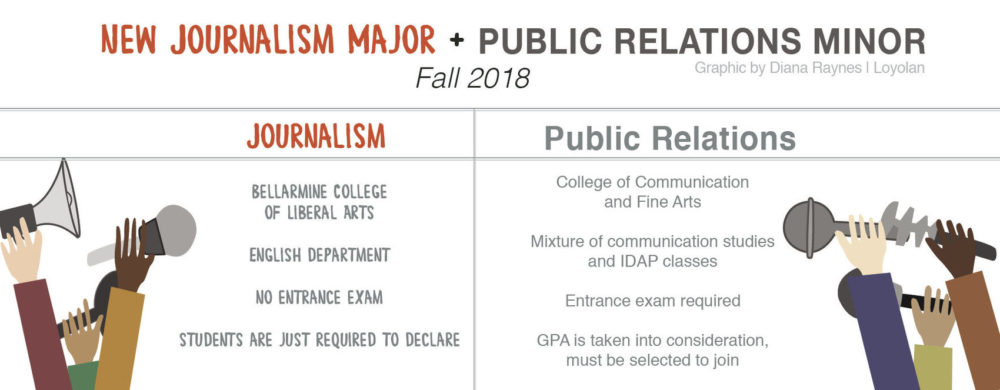
LMU recently announced that they are adding new majors and minors to the LMU curriculum. Starting in the fall of 2018, students will be able to declare a journalism major through the English department under the Bellarmine College of Liberal Arts. Additionally, the College of Communication and Fine Arts will be introducing a public relations (PR) minor.
“I think the timing is also strangely fortuitous because there is so much attention placed on journalism right now, so it is also ironically good timing,” said Evelyn McDonnell, director of the journalism program and English professor. She added that student interest was the driving force behind the creation of this major.
“Journalism at LMU connects the educational values of the Jesuit and Marymount traditions and the core creative and critical practices of the English Department to the rapidly changing future of global communication” and is designed to be hands-on as well as theoretical to create professional journalists, according to the Journalism program page.
“New academic programs are developed to meet student demands for subject-area study, to manifest faculty passions and to create avenues for in-depth study of emergent fields,” said Robbin Crabtree, dean of Bellarmine College of Liberal Arts.
She added that among journalism, other new majors include international relations and environmental studies. There are also minor programs in the works, including: health in society, global economics, peace and justice studies and a concentration in public history within the history department.
Right now, there is no application process for the journalism program. A student seeking a journalism major needs to declare it and maintain a C average in order to remain in the program. McDonnell said working journalists have to work harder now more than ever, as they act as a pillar of democracy. With this new major they want to, “turn out journalists of the future,” she said.
The PR minor will involve a combination of classes between the communication studies department (CMST) and interdisciplinary applied programs (IDAP). Its purpose is to immerse students and prepare them for a professional career in the industry. The minor “will prepare students to work in a fast-paced, professional field that requires trained, ethical communicators and strategic thinkers,” according to the PR minor program page.
Developing this program will, “offer a minor that further concretizes student interest in a formal course of study that students can now formally claim as a minor,” said Bryant Alexander, dean of the College of Communication and Fine Arts. He added that LMU seeks to provide students with educational experiences that will effectively prepare them for a career in their desired field. Consistent student interest in IDAP has influenced the development of this program, according to Alexander.
Anyone that is interested in declaring a PR minor must first take a test, fill out a few forms and then they may be selected to join the program. The test acts as an entrance exam, according to Dean Scheibel, professor of communication studies and the chair of IDAP. He added that there are an expected 48 spots in the PR minor for the upcoming class. The test is centered around writing and the student’s knowledge of AP style.
If you wish to take the test, brushing up on writing skills is recommended, according to Michele Hammers, professor and chair of communication studies. She added that GPA factors in as well; this procedure is only in place due to capacity limitations. There is a test on March 24 from 3:30 p.m. until 5 p.m. in Pereira Hall room 140. Just bring a valid One Card and CAPP report to the testing site.
“We’ve never had the capacity to do it until recently,” said Hammers. “We’re hoping it will give students that are already taking IDAP classes a chance to have a more well-rounded experience.”
Students that are committed and passionate about PR are encouraged to apply. Hammers added that there is a for-credit internship requirement at the end of the minor, to provide real world experience.
The Academic Planning and Review Committee (APRC) consists of 13 faculty members representing the colleges and schools at LMU.
When students enter professional careers, new majors and minors are proposed in order to meet their needs.
“Our mission is to review proposals for new or revised majors, minors, graduate and certificate programs,” said Professor John Dorsey, chair of the ARPC and professor of civil engineering and environmental science.
“Occasionally there’s a need to develop and implement a new program so our students can more effectively meet the demands of a changing world,” Dorsey said.
This article previously appeared in the Los Angeles Loyolan on February 28, 2018.
By: Kayla Brogan, Asst. News Editor



